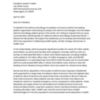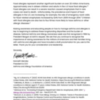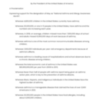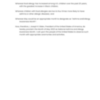In 1984, President Ronald Reagan declared a week in May to be National Asthma and Allergy Awareness Week at the request of the Asthma and Allergy Foundation of America (AAFA). Since then, we have expanded our annual awareness campaign to a full month. May is a perfect time to educate patients, family, friends, co-workers, and other people about asthma and allergic diseases that impact more than 100 million people in America.
Each year, AAFA continues to spread awareness in May during National Asthma and Allergy Awareness Month. Recently, AAFA sent a letter to President Biden asking him to declare May to be National Asthma and Allergy Awareness Month (see letter below). The letter highlights the importance of promoting awareness, education, and understanding of these diseases.
You can join our efforts to improve asthma and allergy awareness and health care in three ways.
- Use our simple tool below to send a tweet to President Biden and join AAFA in requesting this important declaration.
- Use the White House contact form to email President Biden using this link: whitehouse.gov/contact
- Call the White House at 202-456-6213.
Let’s make the 40th anniversary of National Asthma and Allergy Awareness Month count!
President Joseph R. Biden
The White House
1600 Pennsylvania Avenue, N.W.
Washington, DC 20500
April 4, 2024
Dear Mr. President,
On behalf of the Asthma and Allergy Foundation of America (AAFA), the leading patient organization advocating for people with asthma and allergies and the oldest asthma and allergy patient group in the world, I am writing to request that you issue a proclamation declaring May as “National Asthma and Allergy Awareness Month.” I believe this declaration will support the leadership you’ve already demonstrated, and AAFA has supported, in addressing health equity, climate change, access to health care, and lowering the cost of inhalers.
I was honored to attend your event on April 3 on lowering health care costs where you recognized that in the United States, asthma presents significant burdens for over 27 million adults and children, as well as their families and caregivers. Annually, asthma costs our society an estimated $82 billion in direct and indirect expenses, including medical costs related to 4.9 million office visits, 1.5 million emergency visits, and 169,330 hospitalizations. It is estimated that from 2019 to 2038, the total cost of uncontrolled asthma could exceed $963 billion in direct and indirect costs. Asthma is also the leading chronic disease among children and a top reason for missed school days.
Racial and ethnic disparities in the burden of asthma have long been established and supported by a large body of evidence. Black people in the U.S. have the highest rates of asthma. Black people are nearly three times more likely to die from asthma than White Americans. Black patients are also nearly 6 times more likely to be treated for asthma in hospital emergency rooms compared to White patients. These disparities are largely driven by interrelated and multidimensional social and structural determinants. Long-term systemic racism and discriminatory policies in housing, education, labor, health care, and the environment have created disadvantages for minority populations and exacerbated racial disparities in health.
Food allergies represent another significant burden on over 20 million people in America. Approximately 1 in 16 children and adults in the U.S have food allergies.1,2 Food allergies can result in a severe reaction caused anaphylaxis that in rare cases can lead to death. Unfortunately, the prevalence and impact of food allergies in the U.S. are increasing; for example, the rate of emergency room visits for food-related anaphylaxis increased by 124% from 2005 through 2014.3 Children with food allergies are also two to four times more likely to have asthma or other allergic diseases.4
Raising awareness and educating people on how to manage asthma and allergies is key to beginning to address these longstanding disparities and the burden of disease. National Asthma and Allergy Awareness week was first recognized in 1984 by President Reagan at AAFA’s request. We ask that you continue to recognize the importance of raising awareness for the millions of Americans and their families living with asthma and allergies and have included a draft proclamation for you use to this letter. Thank you for your consideration and leadership.
Sincerely,
Kenneth Mendez
President and CEO
Asthma and Allergy Foundation of America
By the President of the United States of America
A Proclamation
Expressing support for the designation of May as “National Asthma and Allergy Awareness Month.”
Whereas 4,500,000 children in the United States currently have asthma;
Whereas over 27 million people in the United States have asthma and the numbers are increasing each year;
Whereas in 2018 on average, children missed more than 7,900,000 days of school and adults missed 10,900,000 days of work because of asthma;
Whereas asthma is one of the most common noncommunicable diseases among children;
Whereas 1,500,000 individuals per year visit emergency departments because of asthma’s effects;
Whereas asthma is a leading cause of hospitalizations and school absences due to a chronic disease among children;
Whereas the total economic cost of asthma in the United States was $81,900,000,000 per year from 2008 to 2013;
Whereas fewer than half of people with asthma report being given an asthma action plan, which is key to the prevention of asthma attacks;
Whereas Black, Hispanic, and Indigenous individuals in the United States face the highest burden of asthma;
Whereas asthma is a manageable disease that claimed the lives of over 3,500 Americans in 2021;
Whereas 20,300,000 people in the United States have food allergies, including about 4,300,000 children;
Whereas food allergy has increased among children in the U.S. over the past 20 years, with the greatest increase in Black children;
Whereas children with food allergies are two to four times more likely to have asthma or other allergic diseases; and
Whereas May would be an appropriate month to designate as “Asthma and Allergy Awareness Month”:
Now, therefore, I, Joseph R. Biden, President of the United States of America, do hereby proclaim the Month of May 2024 as National Asthma and Allergy Awareness Month. I call upon the people of the United States to observe such month with appropriate ceremonies and activities.
References
1. Ng, A.E. & Boersma, P. (2023). NCHS Data Brief, no 460: Diagnosed allergic conditions in adults: United States, 2021. National Center for Health Statistics. https://dx.doi.org/10.15620/cdc:122809
2. Zablotsky, B., Black, L.I., & Akinbami, L.J.(2023). NCHS Data Brief, no 459: Diagnosed allergic conditions in children aged 0-17 years: United States, 2021. National Center for Health Statistics. https://dx.doi.org/10.15620/cdc:123250
3. Motosue et al., “Increasing Emergency Department Visits for Anaphylaxis, 2005-2014.” J Allergy Clin Immunol Pract. 2017 Jan - Feb;5(1):171-175.
4. Branum, A., & Lukacs, S. (2019). Food Allergy Among U.S. Children: Trends in Prevalence and Hospitalizations. Centers for Disease Control and Prevention; National Center for Health Statistics. https://www.cdc.gov/nchs/products/databriefs/db10.htm






Comments (0)